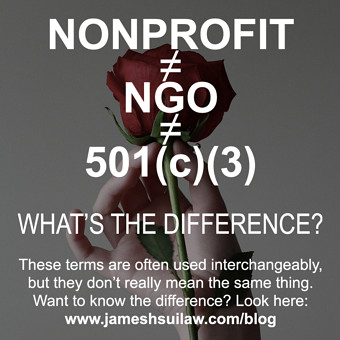
“Nonprofit” or “Nonprofit Organization (NPO),” “Non-Governmental-Organization (NGO)” and 501(c)(3) are terms often used, in the United States, informally to describe the same thing: an organization exempt from taxation under section 501(c)(3) of the Internal Revenue Code (i.e. “501(c)(3)” organization). However, each of these terms actually has a different and specific meaning. In short, an “NGO” is a subset of a nonprofit, not every nonprofit or NGO is a 501(c)(3), and all 501(c)(3)s are nonprofits.
Nonprofit
“Nonprofit” refers to the non-profit-making objectives of an organization. It is a state law concept. Under Delaware’s General Corporation Law, a nonprofit nonstock corporation is one where no insider has a right to share in the profits and losses of the corporation, or to receive distributions of the assets of the corporation. Likewise, under the New York Not-for-Profit Corporation law, a not-for-profit corporation is one that is organized exclusively for one or more purposes other than for pecuniary profit or financial gain, and where no part of the assets, income or profit of the corporation is distributable to, or inures to the benefit of, insiders, except as permitted by law. Charities, churches, chambers of commerce and government agencies could all be considered nonprofits.
501(c)(3) and Other 501(c)s
“501(c)(3)” refers to Section 501(c)(3) of the Internal Revenue Code (the U.S. Tax Code). Sections 501(c)(1) to 501(c)(29) each describes a specific type of nonprofit that is exempt from federal (U.S.) income taxes. Specifically, 501(c)(3) describes a nonprofit that:
- Is organized and operated exclusively for religious, charitable, scientific, literary, or educational purposes (plus a few other public benefit purposes recognized by the Internal Revenue Service);
- Where no part of its net earnings inure to the benefit of anyone with a personal or private interest in the nonprofit;
- Which does not engage substantially in lobbying; and
- Which does not participate or intervene in any political campaign for or against a public office candidate.
501(c)(3) nonprofits include charities, schools, houses of worship, and amateur sports organizations. In contrast, 501(c)(6) describes chambers of commerce and boards of trade, 501(c)(7) describes social clubs, 501(c)(8) describes certain formal fraternities and sororities, and 501(c)(19) includes United States veterans organizations. It is important to understand that, first and foremost, 501(c) is a tax status that provides federal tax-exemption, and in the case of 501(c)(3) tax benefits to donors. An nonprofit that does not have 501(c) or any other tax-exempt status is treated, for federal tax purposes, similarly to a for-profit. In the case of a nonprofit corporation, a non tax-exempt nonprofit would be taxed like a “subchapter C” corporation (also known as a “C-Corporation”).
NGO
“NGO” refers to the control of a nonprofit, specifically one that it is not subject to government control. So organizations such as the United Nations, World Trade Organization or the North American Treaty Organization, would not be considered NGOs because they are ultimately subject to the control of the governments of their member states (i.e. countries that make up their membership) — these organizations are called intergovernmental organizations or “IGOs.” Likewise, U.S. and state government agencies would not be considered NGOs because they are controlled by state or federal government. 501(c)(3) organizations where directors or members are mostly comprised of government officials serving in their official government capacity rather than their private capacity would not be considered NGOs because a controlling vote is held by government or governments. In the US, there is no legal definition for NGO, and so there is no legal “NGO” status, and the term colloquially refers to 501(c)(3) organizations that are not government controlled.
In the international arena, under Resolution 1996/31, Part I(12), of the Economic and Social Council (ECOSOC) of the United Nations, for the purpose of NGO consultative status with ECOSOC,
The organization shall have a representative structure and possess appropriate mechanisms of accountability to its members, who shall exercise effective control over its policies and actions through the exercise of voting rights or other appropriate democratic and transparent decision-making processes. Any such organization that is not established by a governmental entity or intergovernmental agreement shall be considered a non-governmental organization for the purpose of these arrangements, including organizations that accept members designated by governmental authorities, provided that such membership does not interfere with the free expression of views of the organization.
We hope this post has been helpful for you in understanding the difference between nonprofit, 501(c) and NGO.
This blog post is provided for general informational purposes only. It is not legal advice, and should not be a substitute for legal advice. If you have questions or comments about the post, or would like to learn more about something in the post, please feel free to contact me.
Additionally, you may be interested in taking a look at my New York nonprofit law services.

No thoughts on "Nonprofit, NGO & 501(c)(3) – What’s the Difference?."